
Poker is a family of comparing card games in which players wager over which hand is best according to that specific game's rules. It is played worldwide, but in some places the rules may vary. While the earliest known form of the game was played with just 20 cards, today it is usually played with a standard deck, although in countries where short packs are common, it may be played with 32, 40 or 48 cards. Thus poker games vary in deck configuration, the number of cards in play, the number dealt face up or face down, and the number shared by all players, but all have rules that involve one or more rounds of betting.
In traditional poker games, the player with the best traditional hand wins the whole pot. Lowball variations award the pot to the lowest hand, by any of several methods. High-low split games are those in which the pot is divided between the player with the best traditional hand and the player with the low hand.
There are several actions in poker called declaration, in which a player formally expresses his intent to take some action . For example, one may verbally declare an action while in turn, which obligates the player to complete that action. One may declare a number of cards to draw in a draw poker game, or one may declare some other choice specific to the variant being played.
In poker, pot odds are the ratio of the current size of the pot to the cost of a contemplated call. Pot odds are compared to the odds of winning a hand with a future card in order to estimate the call's expected value. The purpose of this is to statistically guide a player's decision between the options of call or fold. Raising is an alternative to place this decision on the opponent.

Omaha hold 'em is a community card poker game similar to Texas hold 'em, where each player is dealt four cards and must make their best hand using exactly two of them, plus exactly three of the five community cards. The exact origin of the game is unknown, but casino executive Robert Turner first brought Omaha into a casino setting when he introduced the game to Bill Boyd, who offered it as a game at the Las Vegas Golden Nugget Casino. Omaha uses a 52-card French deck. Omaha hold 'em 8-or-better is the "O" game featured in H.O.R.S.E.

In the card game of poker, a bluff is a bet or raise made with a hand which is not thought to be the best hand. To bluff is to make such a bet. The objective of a bluff is to induce a fold by at least one opponent who holds a better hand. The size and frequency of a bluff determines its profitability to the bluffer. By extension, the phrase "calling somebody's bluff" is often used outside the context of poker to describe situations where one person demands that another proves a claim, or proves that they are not being deceptive.
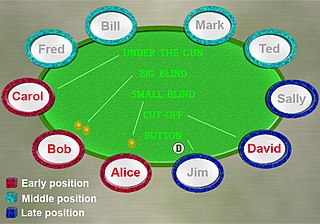
In the game of poker, the play largely centers on the act of betting, and as such, a protocol has been developed to speed up play, lessen confusion, and increase security while playing. Different games are played using different types of bets, and small variations in etiquette exist between cardrooms, but for the most part the following rules and protocol are observed by the majority of poker players.

Texas hold 'em is one of the most popular variants of the card game of poker. Two cards, known as hole cards, are dealt face down to each player, and then five community cards are dealt face up in three stages. The stages consist of a series of three cards, later an additional single card, and a final card. Each player seeks the best five-card poker hand from any combination of the seven cards: the five community cards and their two hole cards. Players have betting options to check, call, raise, or fold. Rounds of betting take place before the flop is dealt and after each subsequent deal. The player who has the best hand and has not folded by the end of all betting rounds wins all of the money bet for the hand, known as the pot. In certain situations, a "split pot" or "tie" can occur when two players have hands of equivalent value. This is also called "chop the pot". Texas hold 'em is also the H game featured in HORSE and HOSE.
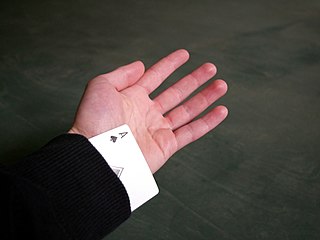
Cheating in poker is any behavior outside the rules of poker that is intended to give an unfair advantage to one or more players.
The following outline is provided as an overview of and topical guide to poker:
Kuhn poker is a simplified form of poker developed by Harold W. Kuhn as a simple model zero-sum two-player imperfect-information game, amenable to a complete game-theoretic analysis. In Kuhn poker, the deck includes only three playing cards, for example, a King, Queen, and Jack. One card is dealt to each player, which may place bets similarly to a standard poker. If both players bet or both players pass, the player with the higher card wins, otherwise, the betting player wins. It was recently solved using Perfect Bayesian Equilibrium notions by Loriente and Diez (2023).
In poker, bad beat is a subjective term for a hand in which a player with what appear to be strong cards nevertheless loses. It most often occurs where one player bets the clearly stronger hand and their opponent makes a mathematically poor call that wins with any subsequent dealing to complete the hand.
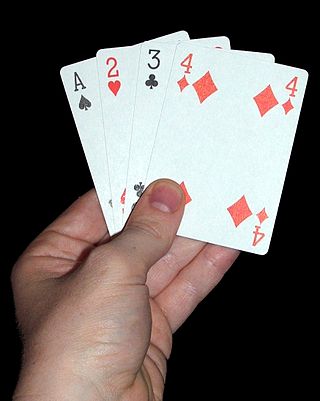
Badugi is a draw poker variant similar to triple draw, with hand-values similar to lowball. The betting structure and overall play of the game is identical to a standard poker game using blinds, but, unlike traditional poker which involves a minimum of five cards, players' hands contain only four cards at any one time. During each of three drawing rounds, players can trade zero to four cards from their hands for new ones from the deck, in an attempt to form the best badugi hand and win the pot. Badugi is often a gambling game, with the object being to win money in the form of pots. The winner of the pot is the person with the best badugi hand at the conclusion of play. Badugi is played in cardrooms around the world, as well as online, in rooms such as PokerStars. Although it hasn’t had its own tournament per se at the WSOP, it is featured in the Dealers Choice events as well as in the Triple Draw Mix. The 2023 WSOP event does have a Badugi tournament scheduled.
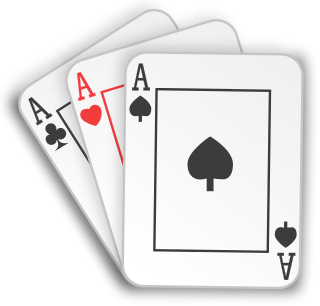
Teen patti is a gambling card game. Teen Patti originated in India and is popular throughout South Asia. It originated in the English game of three-card brag, with influences from poker. It is also called flush or flash in some areas.

Cash games, also sometimes referred to as ring games or live action games, are poker games played with "real" chips and money at stake, often with no predetermined end time, with players able to enter and leave as they see fit. In contrast, a poker tournament is played with tournament chips worth nothing outside the tournament, with a definite end condition, and a specific roster of competitors.
The following is a glossary of poker terms used in the card game of poker. It supplements the glossary of card game terms. Besides the terms listed here, there are thousands of common and uncommon poker slang terms. This is not intended to be a formal dictionary; precise usage details and multiple closely related senses are omitted here in favor of concise treatment of the basics.
Poker is a popular card game that combines elements of chance and strategy. There are various styles of poker, all of which share an objective of presenting the least probable or highest-scoring hand. A poker hand is usually a configuration of five cards depending on the variant, either held entirely by a player or drawn partly from a number of shared, community cards. Players bet on their hands in a number of rounds as cards are drawn, employing various mathematical and intuitive strategies in an attempt to better opponents.
Draw poker is any poker variant in which each player is dealt a complete hand before the first betting round, and then develops the hand for later rounds by replacing, or "drawing", cards.
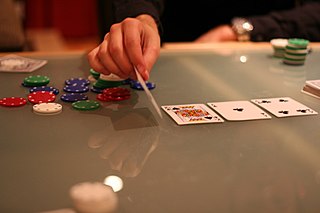
Community card poker refers to any game of poker that uses community cards, which are cards dealt face up in the center of the table and shared by all players. In these games, each player is dealt an incomplete hand face down, which are then combined with the community cards to make a complete hand. The set of community cards is called the "board", and may be dealt in a simple line or arranged in a special pattern. Rules of each game determine how they may be combined with each player's private hand. The most popular community card game today is Texas hold 'em, originating sometime in the 1920s.








